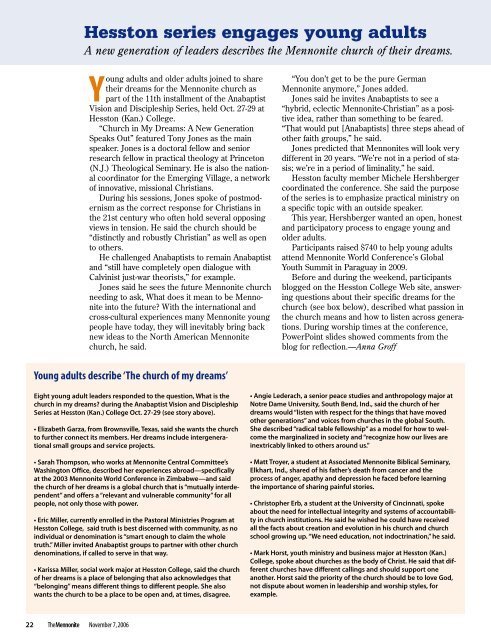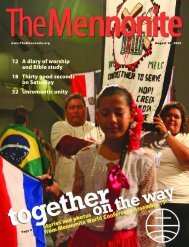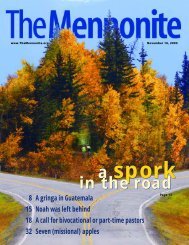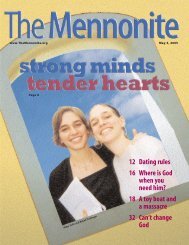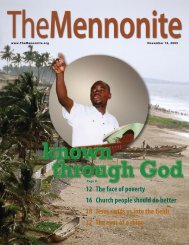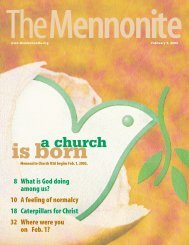11:7,6 - The Mennonite
11:7,6 - The Mennonite
11:7,6 - The Mennonite
You also want an ePaper? Increase the reach of your titles
YUMPU automatically turns print PDFs into web optimized ePapers that Google loves.
22 <strong>The</strong><strong>Mennonite</strong> November 7, 2006<br />
Hesston series engages young adults<br />
A new generation of leaders describes the <strong>Mennonite</strong> church of their dreams.<br />
Young adults and older adults joined to share<br />
their dreams for the <strong>Mennonite</strong> church as<br />
part of the <strong>11</strong>th installment of the Anabaptist<br />
Vision and Discipleship Series, held Oct. 27-29 at<br />
Hesston (Kan.) College.<br />
“Church in My Dreams: A New Generation<br />
Speaks Out” featured Tony Jones as the main<br />
speaker. Jones is a doctoral fellow and senior<br />
research fellow in practical theology at Princeton<br />
(N.J.) <strong>The</strong>ological Seminary. He is also the national<br />
coordinator for the Emerging Village, a network<br />
of innovative, missional Christians.<br />
During his sessions, Jones spoke of postmodernism<br />
as the correct response for Christians in<br />
the 21st century who often hold several opposing<br />
views in tension. He said the church should be<br />
“distinctly and robustly Christian” as well as open<br />
to others.<br />
He challenged Anabaptists to remain Anabaptist<br />
and “still have completely open dialogue with<br />
Calvinist just-war theorists,” for example.<br />
Jones said he sees the future <strong>Mennonite</strong> church<br />
needing to ask, What does it mean to be <strong>Mennonite</strong><br />
into the future? With the international and<br />
cross-cultural experiences many <strong>Mennonite</strong> young<br />
people have today, they will inevitably bring back<br />
new ideas to the North American <strong>Mennonite</strong><br />
church, he said.<br />
Young adults describe ‘<strong>The</strong> church of my dreams’<br />
Eight young adult leaders responded to the question, What is the<br />
church in my dreams? during the Anabaptist Vision and Discipleship<br />
Series at Hesston (Kan.) College Oct. 27-29 (see story above).<br />
• Elizabeth Garza, from Brownsville, Texas, said she wants the church<br />
to further connect its members. Her dreams include intergenerational<br />
small groups and service projects.<br />
• Sarah Thompson, who works at <strong>Mennonite</strong> Central Committee’s<br />
Washington Office, described her experiences abroad—specifically<br />
at the 2003 <strong>Mennonite</strong> World Conference in Zimbabwe—and said<br />
the church of her dreams is a global church that is “mutually interdependent”<br />
and offers a “relevant and vulnerable community” for all<br />
people, not only those with power.<br />
• Eric Miller, currently enrolled in the Pastoral Ministries Program at<br />
Hesston College, said truth is best discerned with community, as no<br />
individual or denomination is “smart enough to claim the whole<br />
truth.” Miller invited Anabaptist groups to partner with other church<br />
denominations, if called to serve in that way.<br />
• Karissa Miller, social work major at Hesston College, said the church<br />
of her dreams is a place of belonging that also acknowledges that<br />
“belonging” means different things to different people. She also<br />
wants the church to be a place to be open and, at times, disagree.<br />
“You don’t get to be the pure German<br />
<strong>Mennonite</strong> anymore,” Jones added.<br />
Jones said he invites Anabaptists to see a<br />
“hybrid, eclectic <strong>Mennonite</strong>-Christian” as a positive<br />
idea, rather than something to be feared.<br />
“That would put [Anabaptists] three steps ahead of<br />
other faith groups,” he said.<br />
Jones predicted that <strong>Mennonite</strong>s will look very<br />
different in 20 years. “We’re not in a period of stasis;<br />
we’re in a period of liminality,” he said.<br />
Hesston faculty member Michele Hershberger<br />
coordinated the conference. She said the purpose<br />
of the series is to emphasize practical ministry on<br />
a specific topic with an outside speaker.<br />
This year, Hershberger wanted an open, honest<br />
and participatory process to engage young and<br />
older adults.<br />
Participants raised $740 to help young adults<br />
attend <strong>Mennonite</strong> World Conference’s Global<br />
Youth Summit in Paraguay in 2009.<br />
Before and during the weekend, participants<br />
blogged on the Hesston College Web site, answering<br />
questions about their specific dreams for the<br />
church (see box below), described what passion in<br />
the church means and how to listen across generations.<br />
During worship times at the conference,<br />
PowerPoint slides showed comments from the<br />
blog for reflection.—Anna Groff<br />
• Angie Lederach, a senior peace studies and anthropology major at<br />
Notre Dame University, South Bend, Ind., said the church of her<br />
dreams would “listen with respect for the things that have moved<br />
other generations” and voices from churches in the global South.<br />
She described “radical table fellowship” as a model for how to welcome<br />
the marginalized in society and “recognize how our lives are<br />
inextricably linked to others around us.”<br />
• Matt Troyer, a student at Associated <strong>Mennonite</strong> Biblical Seminary,<br />
Elkhart, Ind., shared of his father’s death from cancer and the<br />
process of anger, apathy and depression he faced before learning<br />
the importance of sharing painful stories.<br />
• Christopher Erb, a student at the University of Cincinnati, spoke<br />
about the need for intellectual integrity and systems of accountability<br />
in church institutions. He said he wished he could have received<br />
all the facts about creation and evolution in his church and church<br />
school growing up. “We need education, not indoctrination,” he said.<br />
• Mark Horst, youth ministry and business major at Hesston (Kan.)<br />
College, spoke about churches as the body of Christ. He said that different<br />
churches have different callings and should support one<br />
another. Horst said the priority of the church should be to love God,<br />
not dispute about women in leadership and worship styles, for<br />
example.


